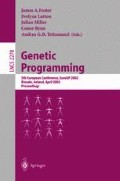Abstract
The traditional genetic programming crossover and mutation operators have the property that they tend to affect smaller and smaller fractions of a solution tree as the tree grows larger. It is generally thought that this property contributes to the ‘code bloat’ problem, in which evolving solution trees rapidly become unmanageably large, and researchers have investigated alternate operators designed to avoid this effect. We introduce one such operator, called uniform subtree mutation (USM), and investigate its performance—alone and in combination with traditional crossover-on six standard problems. We measure its behavior using both computational effort and size effort, a variation that takes tree size into account. Our tests show that genetic programming using pure USM reduces evolved tree sizes dramatically, compared to crossover, but does impact solution quality somewhat. In some cases, however, a combination of USM and crossover yielded both smaller trees and superior performance, as measured both by size effort and traditional metrics.
Access this chapter
Tax calculation will be finalised at checkout
Purchases are for personal use only
Preview
Unable to display preview. Download preview PDF.
References
P. J. Angeline. Genetic programming and emergent intelligence. In K. E. Kinnear, Jr., editor, Advances in Genetic Programming, chapter 4, pages 75–98. MIT Press, 1994.
P. J. Angeline. Subtree crossover causes bloat. In John R. Koza et al., editors, Proceedings of the Third Annual Genetic Programming Conference, pages 745–752, Madison, Wisconson, July 1998. Morgan Kaufmann.
Tobias Blickle and Lothar Thiele. Genetic programming and redundancy. In J. Hopf, editor, Genetic Algorithms Within the Frameworkof Evolutionary Computation (Workshop at KI-94, Saarbrücken), pages 33–38, Saarbrücken, Germany, 1994.
Kumar Chellapilla. Evolvingcomputer programs without subtree crossover. IEEE Transactions on Evolutionary Computation, 1(3):209–216, September 1997.
Aniko Ekart. Controlling code growth in genetic programming by mutation. In W.B. Langdon et al., editors, Late-Breaking Papers of EuroGP-99, pages 3–12, Göteborg, Sweden, May 1999. Centrum voor Wiskunde en Informatica.
Aniko Ekart and S. Z. Nemeth. Selection based on the pareto nondomination criterion for controlling code growth in genetic programming. Genetic Programming and Evolvable Machines, 2(1):61–73, March 2001.
Matthias Fuchs. Crossover versus mutation: an empirical and theoretical case study. In John R. Koza et al., editors, Proceedings of the Third Annual Genetic Programming Conference, pages 78–85, Madison, Wisconson, July 1998. Morgan Kaufmann.
John Holland. Adaptation in Natural and Artificial Systems. University of Michigan Press, 1975.
John Koza. Genetic Programming: On the Programming of Computers by Means of Natural Selection. MIT Press, Cambridge, MA, 1992.
John Koza. Genetic Programming II: Automatic Discovery of Reusable Programs. MIT Press, Cambridge, MA, 1994.
W. B. Langdon and W. Banzhaf. Genetic programming bloat without semantics. In Marc Schoenauer, editor, PPSN VI, Sixth International Conference on Parallel Problem Solving from Nature, Paris, France, September 2000. Springer-Verlag.
W. B. Langdon and R. Poli. Fitness causes bloat: Mutation. In Wolfgang Banzhaf et al., editors, Proceedings of the First European Workshop on Genetic Programming, volume 1391, pages 37–48, Paris, 14-15 1998. Springer-Verlag.
W.B. Langdon. Size fair and homologous tree genetic programming crossovers. In W. Banzhaf et al., editors, GECCO-99: Proceeings of the Genetic and Evolutionary Computation Conference, volume 2, pages 1092–1097, Orlando, Florida, 1999. Morgan Kaufmann.
Sean Luke. Issues in Scaling Genetic Programming: Breeding Strategies, Tree Generation, and Code Bloat. PhD thesis, University of Maryland, College Park, 2000.
Sean Luke and Lee Spector. A comparison of crossover and mutation in genetic programming. In John R. Koza et al., editors, Genetic Programming 1997: Proceedings of the Second Annual Conference (GP97), pages 240–248, San Francisco, 1997. Morgan Kaufmann.
Sean Luke and Lee Spector. A revised comparison of crossover and mutation in genetic programming. In John R. Koza et al., editors, Genetic Programming 1998: Proceedings of the Third Annual Conference (GP98), pages 208–213, San Francisco, 1998. Morgan Kaufmann.
Ben McKay, Mark J. Willis, and Geofferey W. Barton. Usinga tree structured genetic algorithm to perform symbolic regression. In First International Conference on Genetic Algorithms in Engineering Systems: Innovations and Applications, GALESIA, volume 414, pages 487–492, Sheffield, UK, September 1995.
N. F. McPhee and J. D. Miller. Accurate replication in genetic programming. In L. Eshelman, editor, Genetic Algorithms: Proceedings of the Sixth International Conference (ICGA95), pages 303–309, Pittsburgh, PA, USA, 1995. Morgan Kaufmann.
N. F. McPhee and R. Poli. A schema theory analysis of the evolution of size in genetic programming with linear representations. In Julian F. Miller et al., editors, Proceedings of EuroGP 2001, pages 108–125, Lake Como, Italy, April 2001.
J. Page, R. Poli, and W. B. Langdon. Smooth uniform crossover with smooth point mutation in genetic programming: A preliminary study. In Riccardo Poli et al., editors, Genetic Programming, Proceedings of EuroGP’99, volume 1598, pages 39–49, Goteborg, Sweden, 26-27 1999. Springer-Verlag.
R. Poli. Some steps towards a form of parallel distributed genetic programming. In The 1st online workshop on soft computing (WSC1). Nagoya University, Japan, August 1996.
Bill Punch and Eric Goodman. lil-gp1.1 genetic programming system. http://garage.cps.msu.edu/software/lil-gp/lilgp-index.html.
A. Rzhetsky and F.J. Ayala. The enigma of intron origins. Cell Mol. Life Sci., 55:3–6, 1999.
Terry Van Belle and David H. Ackley. Modifications to lilgp1.1 code to implement uniform subtree mutation. http://keys.cs.unm.edu/USM/.
Annie Wu and Robert Lindsay. A survey of intron research in genetics. In Hans-Michael Voigt et al., editors, Parallel Problem Solving from Nature IV. Springer-Verlag, 1996.
Author information
Authors and Affiliations
Editor information
Editors and Affiliations
Rights and permissions
Copyright information
© 2002 Springer-Verlag Berlin Heidelberg
About this paper
Cite this paper
Van Belle, T., Ackley, D.H. (2002). Uniform Subtree Mutation. In: Foster, J.A., Lutton, E., Miller, J., Ryan, C., Tettamanzi, A. (eds) Genetic Programming. EuroGP 2002. Lecture Notes in Computer Science, vol 2278. Springer, Berlin, Heidelberg. https://doi.org/10.1007/3-540-45984-7_15
Download citation
DOI: https://doi.org/10.1007/3-540-45984-7_15
Published:
Publisher Name: Springer, Berlin, Heidelberg
Print ISBN: 978-3-540-43378-1
Online ISBN: 978-3-540-45984-2
eBook Packages: Springer Book Archive

